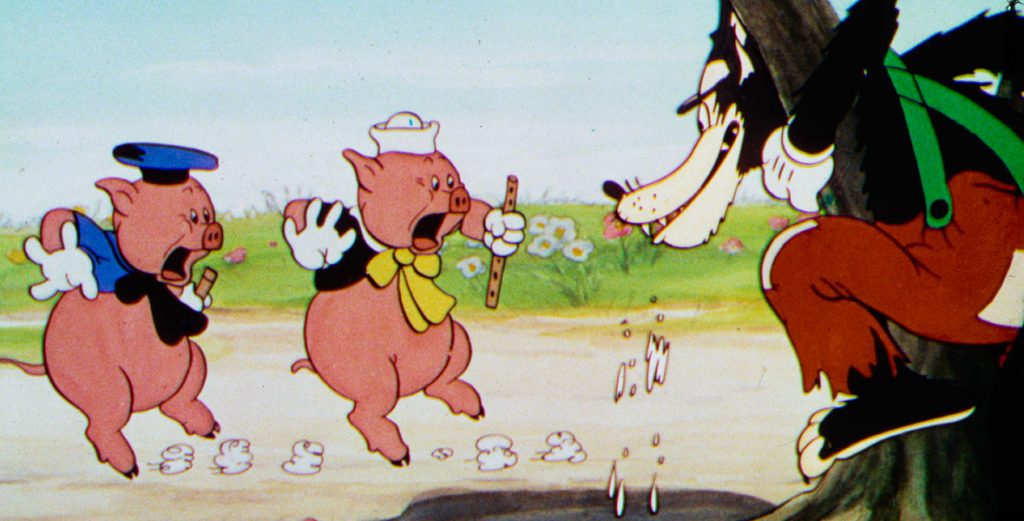The classic fairy tale ‘The Three Little Pigs,’ originating from England and popularized in various adaptations, has entertained audiences since its publication in the 19th century.
This timeless story, with its charming characters and moral lessons, focuses on the clever pigs and their encounter with a cunning wolf.
 As we delve into the tale, it’s essential to examine the 13 treacherous traits of the wolf that not only make him a formidable foe but also provide critical lessons on what behaviors to avoid in life.
As we delve into the tale, it’s essential to examine the 13 treacherous traits of the wolf that not only make him a formidable foe but also provide critical lessons on what behaviors to avoid in life.
1. Deceptiveness: Understanding the Danger of Lies
The wolf’s most notable trait is his deceitfulness. He lies to the pigs to gain their trust and ultimately achieve his selfish goals. As he often says, “All’s fair in love and war,” illustrating his belief that deception is justified. This quality serves as a warning about the importance of honesty in our relationships and interactions.
2. Greed: Wanting More Than One Deserves
Motivated by his desire to devour the pigs, the wolf exemplifies greed. This trait teaches children the importance of sharing and being satisfied with what one has while highlighting the dangers of wanting more than one deserves.
3. Manipulativeness: Using Others for Personal Gain
The wolf uses manipulation to trick the pigs, showing how some individuals may exploit others for their own advantage. Children can learn to recognize manipulation in relationships and understand the importance of honesty.
4. Cowardice: Hiding Behind Tricks
Despite his fierce appearance, the wolf often hides behind trickery and deception when confronting the pigs. This cowardice reflects the notion that true strength comes from courage and honesty, not from tricking or overpowering others.
5. Sneakiness: The Art of Being Underhanded
The wolf’s sneakiness is a key trait as he lurks around the pigs’ homes, waiting for the right moment to strike. This teaches the lesson that individuals who operate in secret often have ulterior motives and should be approached with caution.
6. Cruelty: Enjoying the Suffering of Others
The wolf takes pleasure in scaring and threatening the pigs, embodying cruelty. Children can learn the importance of empathy by recognizing that harming others is never acceptable.
7. Lack of Accountability: Evading Responsibility
The wolf does not take responsibility for his actions, blaming others for his failures. This trait is crucial for children to understand: owning up to one’s mistakes is essential for personal growth and integrity.
8. Arrogance: Believing in Superiority
The wolf’s arrogance, believing he is cleverer than the pigs, leads to his downfall. This characteristic teaches that overestimating oneself can lead to mistakes, emphasizing the importance of humility.
9. Intimidation: Using Fear as a Tactic
The wolf’s use of intimidation to control the pigs demonstrates how fear can be a manipulative tool. Children should learn that true strength lies in safety and security, not in instilling fear in others.
10. Disrespect: Ignoring Boundaries
The wolf disrespects the hard work and safety measures the pigs put in place. This behavior serves as a lesson about the importance of respecting others’ efforts and property.
11. Impatience: Rushing for Immediate Gratification
The wolf’s impatience leads him to make hasty decisions, often resulting in failure. This trait illustrates the significance of patience and careful planning in achieving success.
12. Selfishness: Prioritizing One’s Own Needs
Driven by selfish desires, the wolf disregards the wellbeing of the pigs. This teaches children the importance of thinking about the needs of others and the value of community over individual greed.
13. Dishonorable Tactics: Resorting to Underhanded Means
The wolf employs dishonorable tactics to achieve his goals, showing no regard for fair play. This behavior emphasizes the importance of integrity and the idea that success should be achieved through honorable means.
The wolf from ‘The Three Little Pigs’ serves as a powerful cautionary figure in the tale, embodying a range of treacherous traits that we should all strive to avoid. By understanding and discussing these negative behaviors, we can teach valuable lessons about honesty, respect, and integrity to the next generation.
As we encourage our children to be aware of these traits in others, we simultaneously foster a sense of self-awareness about the values they should embrace in their own lives.







